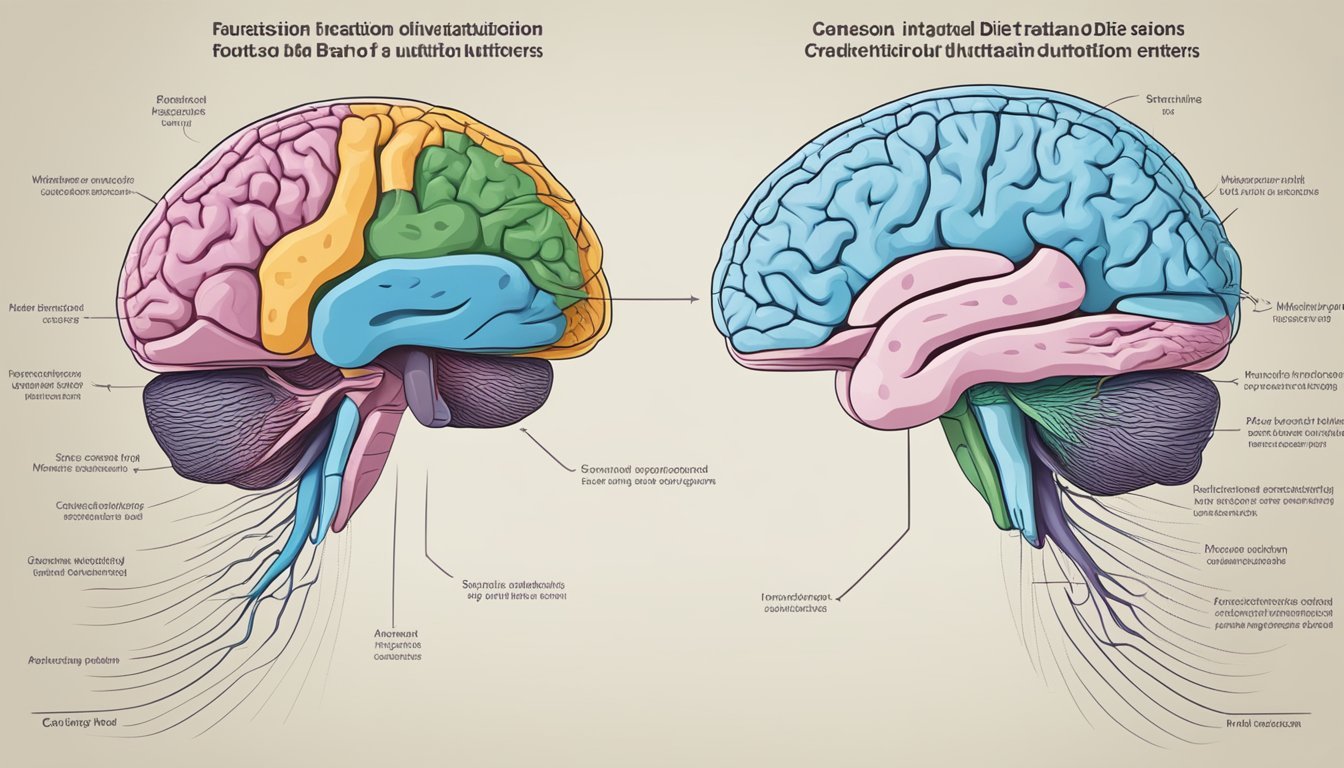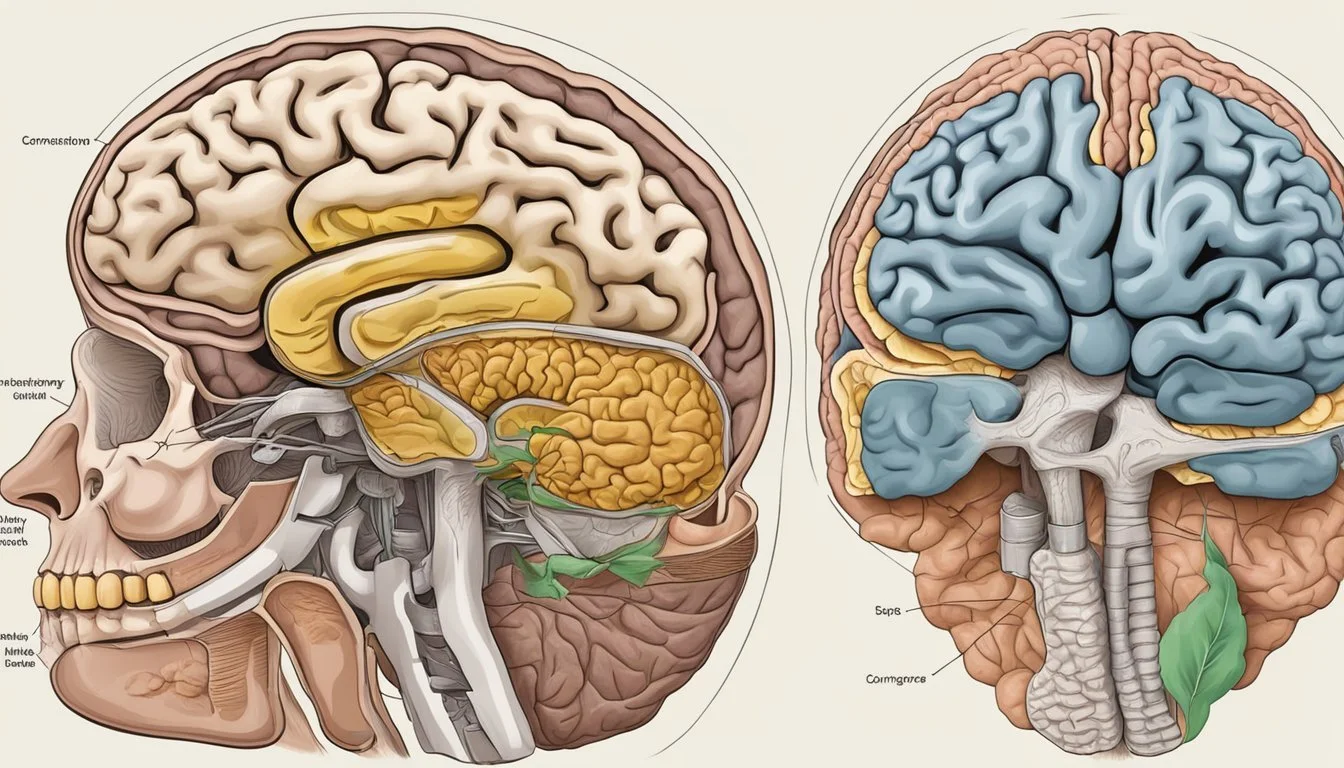Shrinking Brain Centers
A Carnivore Diet Perspective on Cognitive Health
The carnivore diet, characterized by its focus on consuming only animal products, is gaining attention for its potential impacts on brain health. This diet emphasizes proteins and fats from meats, fish, eggs, and dairy, which are crucial for maintaining optimal brain function. Animal products are rich in B vitamins and omega-3 fatty acids, key nutrients that support nerve function and neurotransmitter synthesis, possibly enhancing mental health.
Proponents argue that the carnivore diet can offer significant benefits, including better mental clarity and energy levels. Some studies suggest that omega-3 fatty acids, prevalent in fatty fish like salmon, are vital for cognitive function and may even play a role in reducing inflammation in the brain. This could potentially lead to improved mood and reduced anxiety for some individuals following the diet.
Despite these potential benefits, the exclusion of plant-based foods presents a risk of a less diverse gut microbiome, which can influence the gut-brain axis. It's essential to weigh both the pros and cons of this diet, as the impact on brain centers is complex and multi-faceted. Readers should stay informed and consult healthcare professionals when considering dietary shifts.
Fundamentals of the Carnivore Diet
The Carnivore Diet is a nutritional plan focused solely on the consumption of animal products. Key aspects include its historical roots and how it compares with other dietary practices.
Defining the Carnivore Diet
The Carnivore Diet restricts intake to only animal products such as meat, poultry, fish, eggs, and some dairy. All plant-based foods including vegetables, fruits, grains, legumes, seeds, and nuts are strictly excluded.
This dietary regimen is often termed the "zero carb" diet. Primary nutrients derived from this diet include high protein and essential vitamins like B vitamins, which are critical for energy and brain function. The emphasis on high-quality animal fats also contributes vital omega-3 fatty acids present in foods like fatty fish, supporting various bodily functions.
Historical Context and Evolutionary Perspectives
Proponents argue that ancient humans primarily consumed meat due to hunting and gathering practices. This diet is believed to align with the evolutionary dietary patterns of early human ancestors who relied heavily on animal products for survival.
Historical perspectives suggest that early human diets were rich in proteins and fats sourced from wild animals, which were easier to hunt compared to foraging for plant-based foods. This ancestral dietary model supposedly provided the necessary nutrition required for the development of larger brains, although modern interpretations continue to be debated among scientists and historians.
Comparison with Other Dietary Practices
Compared to other diets such as the ketogenic and paleo diets, the Carnivore Diet is more restrictive.
Ketogenic Diet: Focuses on high fat, moderate protein, and low carbohydrate intake, including specific plant-based foods.
Paleo Diet: Encourages consumption of foods presumed to have been available to humans before the advent of agriculture, including fruits, vegetables, nuts, and seeds alongside animal products.
In contrast, the Carnivore Diet eliminates all carbohydrates and plant-based foods, creating a distinct nutritional profile centered around maximizing protein intake from animal sources.
This stringent exclusion of non-animal products aims to simplify nutritional intake but raises discussions about potential nutrient deficiencies and long-term health impacts.
Nutritional Profile of a Carnivore Diet
The carnivore diet, which consists solely of animal products, offers a unique blend of macronutrients, vitamins, and minerals. However, adhering to this diet requires careful planning to avoid nutrient deficiencies.
Macronutrient Ratios: Protein and Fat Focus
The carnivore diet is predominantly high in protein and fat with very low to no carbohydrates. Protein, sourced from red meat, poultry, and fish, constitutes a significant portion of dietary intake. Fat, especially saturated fat and cholesterol found in fatty cuts of meat and organ meats, provides the primary energy source.
A typical macronutrient breakdown is approximately:
Protein: 25-35%
Fat: 65-75%
Emphasis on fatty fish like salmon can increase the intake of beneficial omega-3 fatty acids.
Vitamins and Minerals in Animal Sources
Animal products are rich in essential nutrients:
Vitamin A: Found in liver and eggs, essential for vision and immune function.
B Vitamins: Thiamine, riboflavin, and niacin are abundant in meats, supporting energy metabolism.
Iron: Heme iron in red meat is highly bioavailable, aiding in oxygen transport.
Omega-3 Fatty Acids: Present in fatty fish, crucial for brain health.
Zinc, Selenium, and Phosphorus: Found in significant amounts in meat, necessary for various biochemical functions.
Organ meats, particularly liver, are nutrient-dense, offering high levels of vitamins and minerals that are hard to obtain in such concentrations from other foods.
Potential Nutrient Deficiencies and Countermeasures
While nutrient-dense, the carnivore diet may lack certain micronutrients typically found in plant foods:
Fiber: Absent in animal products, impacting gut health and potentially causing constipation.
Vitamin C: Minimal amounts in animal sources, necessitating careful planning or supplementation.
Magnesium: Often found in greens and nuts, difficult to obtain solely from animal foods.
Calcium: Usually derived from dairy, but those following a strict meat-only diet might need supplements.
Ensuring a variety of animal sources like different meats, fish, and organ meats can mitigate some deficiencies. Supplements might be necessary to cover gaps, particularly for vitamin C, fiber, and magnesium.
Avoid the crowds and shop for fiber supplement, vitamin C, magnesium, and calcium online from the comfort of your home!
Health Implications of Carnivore Diets
A carnivore diet has been reported to offer various health benefits, including weight management, mental health improvements, and gut health impacts. However, it also presents certain risks and long-term health considerations.
Weight Management and Obesity
The carnivore diet, which emphasizes high protein and fat intake, can aid in weight loss and obesity management. People often report reduced hunger and fewer calorie intake.
Animal proteins and fats are satiating, reducing the need for frequent meals. This can help maintain a caloric deficit, essential for weight loss. Some individuals on the diet have reported significant weight reduction, making it a potential strategy for obesity control.
Mental Health and Cognitive Functions
Mental health and cognitive functions can benefit significantly from a carnivore diet. The diet is rich in proteins and omega-3 fatty acids, which are crucial for brain health. These nutrients support neurotransmitter production and reduce inflammation, which can improve mood and cognitive performance.
Individuals have reported enhancements in memory, mood stability, and overall cognitive functions. Diet-induced ketosis from high fat intake may also have neuroprotective effects.
Gut Health and the Microbiome
The carnivore diet impacts gut health and the microbiome differently compared to mixed diets. Reducing plant-based foods can lower inflammation in individuals with autoimmune conditions and improve symptoms of inflammatory bowel diseases.
However, this diet might cause reduced microbial diversity, which is generally considered beneficial for gut health. Attention to potential risks like constipation is necessary, as the diet lacks dietary fiber.
Risks and Long-Term Health Considerations
Long-term adherence to a carnivore diet presents several risks. Nutritional deficiencies could develop due to the exclusion of fruits, vegetables, and grains. Potential risks include vitamin C and fiber deficiencies.
Cardiovascular health could be affected due to high intakes of saturated fats. The diet's impact on type 2 diabetes remains controversial, as improvements in insulin sensitivity need further study.
Monitoring and potential supplementation might be required to mitigate these risks.
The Carnivore Diet and Brain Health
A carnivore diet can impact brain health through the intake of essential fatty acids, ketone production, and nutrient supply. These factors influence neuronal functions, cognitive performance, and brain structure.
Role of Fats in Neuronal Functions
Fats, especially omega-3 fatty acids like EPA, play a vital role in maintaining brain function. Animal products, such as fatty fish and meat, provide these essential fats.
EPA and DHA, found in fatty fish, are integral to cell membrane health in nerve cells, affecting neurotransmission and neuroprotection. Saturated fats, commonly found in meat, are also necessary for the brain's structure and function. The brain relies on these fats for energy and to support cognitive processes, like memory and focus.
Ketosis and Cognitive Performance
The carnivore diet can induce a state of ketosis, where the body uses ketones instead of glucose for energy. Ketones are known to cross the blood-brain barrier, providing a steady energy source for the brain.
Cognitive benefits such as improved memory, mental clarity, and alertness have been noted during ketosis. The diet's high fat content aids in maintaining this metabolic state, potentially enhancing mental health and cognitive abilities. Ketones offer neuroprotective properties by reducing oxidative stress and promoting cellular repair mechanisms.
Impact of Nutrient Intake on Brain Structure
Animal products are rich in essential nutrients like vitamin B12, tyrosine, and tryptophan, critical for brain health. Vitamin B12, found abundantly in meat, supports nerve function and the synthesis of neurotransmitters like serotonin and dopamine, which are crucial for mood regulation and cognitive function.
Tryptophan, a precursor to serotonin, and tyrosine, a precursor to dopamine, are also vital for maintaining cognitive health and have been associated with improved mood and mental clarity. A diet deficient in these nutrients can lead to cognitive decline. B vitamins, along with other nutrients from animal sources, support neuroprotection and overall brain structure maintenance.
Practical Considerations and Adaptations
Adopting a carnivore diet involves several practical considerations, including creating balanced meals, managing electrolytes, addressing social factors, and understanding the environmental impacts. These components are essential for ensuring that the diet is sustainable and beneficial in the long term.
Creating a Balanced Meal Plan
Constructing a balanced meal plan on a carnivore diet requires careful selection of various animal products. Emphasizing nutrient-rich sources such as beef, fatty fish, eggs, and dairy products provides essential proteins, B vitamins, and omega-3 fatty acids. Incorporating different cuts of meat and animal-based fats like butter can help meet caloric needs. Utilizing nutrition science principles, individuals can create meal plans that support physical health by maintaining an appropriate balance of these nutrients.
Managing Electrolytes and Hydration
Maintaining electrolyte balance is a vital aspect of the carnivore diet. Sodium, potassium, and magnesium levels must be closely monitored. Without the intake of plant-based foods, supplementation or consumption of electrolyte-rich animal products is necessary. Bone broth, mineralized salt, and seaweed can help replenish these essential minerals. Adequate hydration is crucial, as the body may initially lose more water during dietary transitions, requiring mindful water and electrolyte intake to prevent deficiencies.
Addressing Societal and Lifestyle Factors
Adopting this diet can pose social and lifestyle challenges. Eating out might become complicated due to limited menu options that fit the diet's criteria. Planning and preparing meals in advance can aid in adhering to the diet. Social support or engaging with communities, either online or in person, can provide motivation and shared experiences. Flexible approaches such as bringing suitable dishes to social gatherings can help maintain dietary consistency without isolation.
Sustainability and Environmental Impacts
The sustainability of a carnivore diet raises significant environmental concerns. The large-scale production of animal products, especially beef, has a notable carbon footprint. Ethical sourcing of meat and awareness of the environmental impacts are important. Practicing sustainable farming methods and supporting local farmers can mitigate some negative effects. Careful consideration is required to balance personal health goals with broader sustainability issues.
Controversies and Myth-Busting
Discussions about brain shrinkage and dietary impacts often lead to several controversies and myths. The debate around the carnivore diet's influence on brain health brings up questions about nutritional deficiencies and possible health benefits.
Debunking Common Misconceptions
Several myths surround the carnivore diet, particularly regarding protein and fat consumption. One common belief is that a high intake of animal proteins and fats leads to increased cholesterol and heart diseases. Current research suggests that these fears may be unfounded. Studies show that cholesterol from animal sources does not significantly impact overall heart health when balanced with proper nutrients.
Another misconception is that the absence of fiber, carbohydrates, and sugars could lead to brain function decline. While fiber and carbohydrates are important for digestive health, the brain primarily relies on ketones from fats in a low-carb, high-fat diet like carnivory, potentially offering a more stable energy source.
Scientific Evidence and Research Gaps
Scientific evidence on the topic remains divided, with some research suggesting benefits from the carnivore diet due to the elimination of allergens and inflammatory foods often present in a standard diet. For instance, avoiding certain dairy products can reduce inflammation for those with lactose intolerance, indirectly benefiting brain health.
On the other hand, large-scale studies addressing long-term impacts of high animal protein and fat intake on brain size are scarce. Current research gaps include a need for controlled trials comparing brain health markers in carnivores versus those consuming a balanced diet with carbohydrates and fibers. More insights are necessary to establish concrete links between dietary choices and brain shrinkage.
Addressing Criticisms and Concerns
Critics argue that the carnivore diet lacks essential nutrients found in plant-based foods, including fiber and necessary vitamins, which could potentially harm brain function. Addressing these concerns, it is important to note that while some vitamins are more abundant in plants, many can be sufficiently obtained from animal sources, including organ meats.
Fats and proteins in a carnivore diet are highly bioavailable and can support brain health by providing stable fuel and essential amino acids. As for the reduction in carbohydrates, some studies suggest that lower insulin levels and reduced inflammation might offset potential negative impacts, thereby not affecting brain size adversely.
Conclusion and Future Directions
The carnivore diet, consisting solely of animal products, has sparked interest and debate in the nutritional community. While proponents argue for its beneficial effects on mental health and cognitive ability, the absence of dietary fiber and plant-based nutrients raises several nutritional considerations.
Studies suggest that animal-based diets, akin to ketogenic diets, may affect the gut-brain axis. High-fat, low-carb intake can influence neurotransmitter synthesis and nerve function. However, the complete exclusion of plant foods may reduce gut microbiome diversity, a factor crucial to overall health.
To understand potential long-term implications, more research is essential. Future studies should examine the diet's impact on cognitive functions and mental health comprehensively. Key areas for future investigation include:
Nutrient absorption: How does the carnivore diet affect the bioavailability of essential vitamins and minerals?
Mental health outcomes: Are there specific mental health benefits or risks associated with a strict carnivore diet?
Gut microbiome: What are the long-term effects on gut microbiota and their influence on overall well-being?
Emerging research should aim to provide clearer guidance on dietary practices that can sustain brain health and cognitive function over time.












